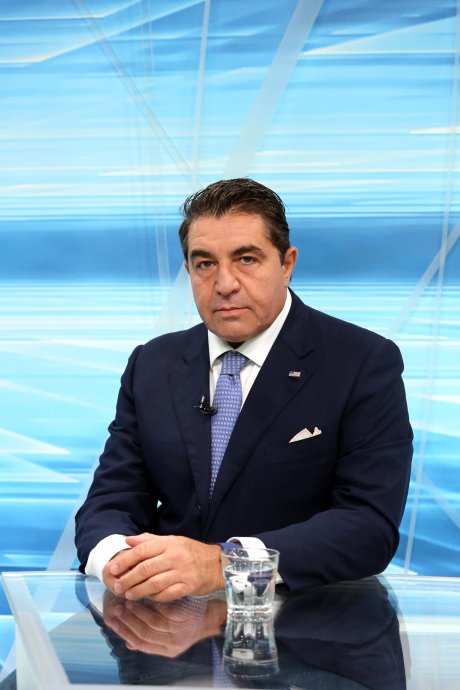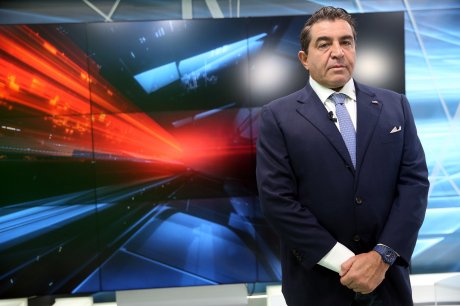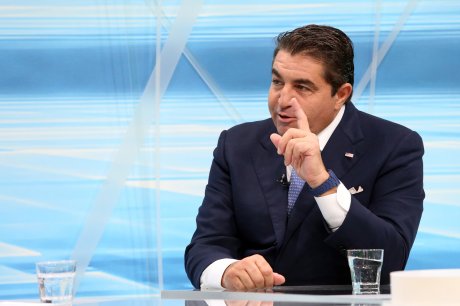Paolo Zampolli: "Serbia was among first to be attacked by drone, now we know how to prevent it"
Drones have been one of the biggest topics of today and one of the biggest concerns in recent years, warns US Ambassador Paolo Zampolli

Paolo Zampolli is a United Nations ambassador, but that is not his only function. He is also the founder of the World Artificial Intelligence Organization (WAIO), as well as a counter-terrorism expert. He remembers promising to visit Serbia, precisely to have a chance to discuss these topics, and we hosted him at Telegraf.
For this reason, Zampolli also recently met with Serbian Interior Minister Nebojsa Stefanovic, and one of the most important topics was the use of drones and security:
"I met briefly Minister Stefanovic when he came to visit the CIA, the FBI, and the New York Police Department for counter-terrorism, and I promised him that I would come and visit Serbia to have an official meeting on these topics: counter-terrorism, drone attacks, and artificial intelligence. We had an excellent meeting and I'm very impressed. I want to congratulate the effort of the Republic of Serbia under the direction of Minister Stefanovic, who is also head of the National Security (Bureau). We discussed migration, which improved drastically since the last few years, Serbia is not a place that is home to new migrants, but a place that people go through. We discussed drone security, which is one of the biggest topics in the United Nations, one of the biggest concerns since a few years," Zampolli told us.
Zampolli recalls that he had warned of drone attacks long before what happened last December at the Gatwick Airport in the UK, before President Nicolas Maduro experienced the threat of a drone attack in Caracas last summer, and all the other drone incidents.
"Serbia was one of the first ones to suffer a drone attack four years ago, in a stadium, during a match between Serbia and Albania. It was not a drone carrying nerve gas or dynamite, but was actually carrying a flag. And we all remember the collateral dysfunction, not the damage it created - it was just a flag," Zampolli recalls.

He is convinced, and as he says, this is being talked about at the United Nations, that drones can carry out real attacks.
"Last year President Putin mentioned that. We have some technology to prevent that. One of the easiest is a drone dome, which would create a dome around a stadium, would not interfere with planes flying, or any other major communications, but a drone would not be able to fly there. The United Nations defines a soft target as a square with a lot of people, a concert, the outside of airports. Soft targets are targeted by modern terrorists, vehicle terrorists - one person who rents a little truck, bus, car and where he sees a lot of people, he wants to run them over. We've seen this happen a lot in the last few years. The only solution for that is to install bollards to protect against a car driving at a certain speed," he explains.
Asked how to prevent illegal use of the increasingly smart drones, he says:
"Unfortunately no law enforcement has the possibility to stop a drone, unless it's a military level device. A drone from across the river in New York can get to Times Square in four or five minutes; one pilot can deploy 10, 20 drones at the same time. I don't want to scare you, but I am very scared talking about it, and I've been telling it to a lot of people. Imagine a drone, carrying nerve gas, on St. Peter's Square (in the Vatican), where we have 60,000 people on a Sunday. We have two attacks there: the people, the massacre, and the faith. Or in the stadiums, that have from 30,000 to 120,000 people, and there's a lot of stadiums around the world every weekend."

You have been talking lately about drug trafficking and the opiate crisis that is happening in the US, but it is also emerging in Europe, though we are not too aware of this problem in Europe?
"This became the first priority of the president of the United States, and also, one of the top pillars of First Lady Melania Trump's program 'Be Best'. I've been talking to many presidents, prime ministers of the EU and other countries - everybody's very receptive. In my meeting with Minister Stefanovic we discussed that two months ago, together with other European countries, you led a very successful operation where you confiscated 2 tons worth 200 million dollars of illegal medicines, and most of these medicines were opioids."
"In the United States of America - and I want people to please listen, because we are not affected in Europe yet - 130 people die every day and 70,000 a year. This is a lot. Opioids are prescribed for big pain after surgery, for real illness. But doctors have been giving these to patients, to young kids, or they have been smuggled, these drugs are not yet considered comparable to old school drugs, but people get really addicted and overdose," Zampolli warns.
"I want to call on families to look in the medicine cabinets of the kids. I had a broken hand a few years ago, they gave me a box of these, I never took them because the doctor said they were very strong and I don't like to take that much medicine. And I found them in the house, because I was even myself unaware of this oxycodone, fentanol, all these kinds of opioids, of which there are a few. But talking to the minister I asked him to please look into that, I would like to see Serbia on the forefront in the region, in the Balkans and in the EU, to start speaking about this new trend, this new epidemic," was his advice.
He also noted that many celebrities are taking risks by using these drugs.
"This is becoming more common and common, the United States of America just this week has been awarding penalties to major drug companies, a few of them. Also, Johnson & Johnson just in one state of the US agreed to pay over 500 million dollars, there are a few others," our interlocutor warns.
(Telegraf.rs)
Telegraf.rs zadržava sva prava nad sadržajem. Za preuzimanje sadržaja pogledajte uputstva na stranici Uslovi korišćenja.




